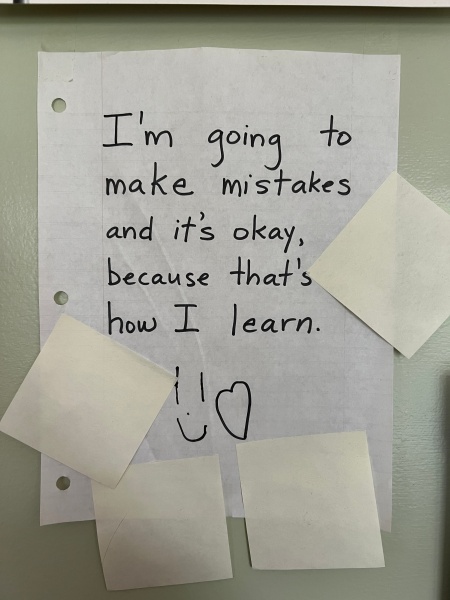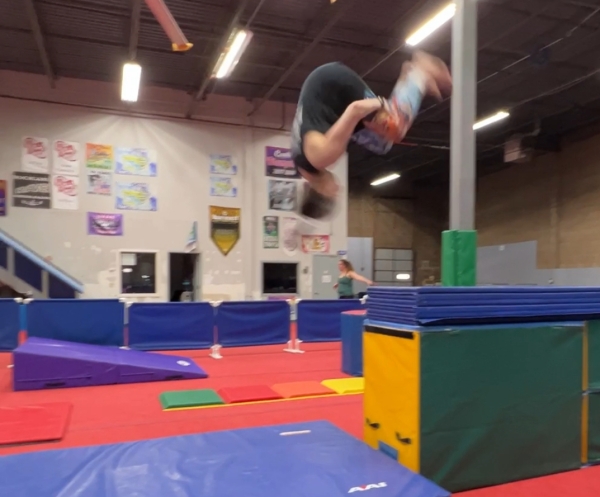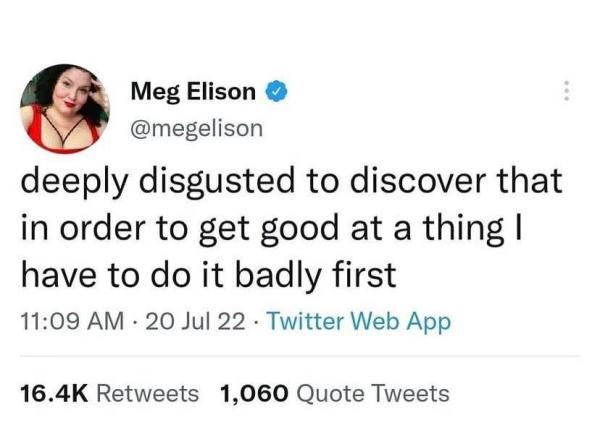This article is the convergence of all areas of my life experience: teaching, parenting, singing, and being a Geriatric Gymnast. No matter what the effort is, I have found myself feeling like I am lacking in more ways than one. I’ve mused a lot about imposter syndrome: I published a meditation about it, talked about it with former students in my Changed for the Better podcasts, questioned my chops as a writer, and managing the doubt while flipping and coaching at the gym. In short, no matter how accomplished we become, everyone suffers from self-doubt.
My job is to bring my whole self, allow my curiosity and creativity to be at the forefront,
and boldly go where I haven’t gone before.
Growing through doubt
In order to get to the place where I stand today, I had to learn how to humble myself, lose my ego and use baby steps when approaching a task. This is especially true when it comes to trying something new or developing a particularly challenging skill. Essentially, it’s about trying, failing, trying again and again and again. I’ve learned this through about 30 years of teaching and coaching people of all ages.
At home
When my kids were little, my younger daughter really struggled with academics, which was quite the opposite experience from her older sister. Nothing came easily to her and she developed a super-low frustration tolerance for making mistakes and not understanding things quickly. I felt for her, since my training as a teacher stressed the importance of perseverance: trying and failing and trying again, a quality she did not easily embrace. One day, while she was all out of sorts about making a mistake, I wrote this note on a piece of loose-leaf paper:

I stuck it on the wall in front of the kitchen table, where she did her homework. It’s still up there today, over a decade later.
The good news is, despite her struggles and frustration over the years, my “little one” is finishing her first year of college. She has support and still struggles, but she seems to be embracing the idea that things happen with effort and time. If I’ve learned anything about that kid, it’s that if it matters to her, she’ll figure it out, eventually.
At the gym
We all experience that frustration to our own degree. I often feel the heaviness at the gym when I’m fighting through my Lizard brain and mid-life perimenopausal body to access new skill sets. Sometimes, it’s just about working to maintain and stay consistent with skills I’ve already achieved that sometimes come and go; this can wreak havoc on my spirit, especially when I’m dealing with injuries.
Despite the setbacks, there’s a significant part of my brain that yearns to move forward and learn cool, new stuff. Even if I am taking baby steps, or taking two steps back for every one forward, the reward of personal success, no matter how small, really excites my soul.
You can read a story about a recent experience I had at the gym in Mental Breakthroughs 2.

At work
Teaching adolescents to be performing artists is like wading through a murky bog. You never know what is underneath what you see, and whether something is about to bite your leg. The trek through it is fraught with anxiety and doubt and while you can see the other side, it takes so much time and effort to get there.

You know you have to go through it, but the way through can be treacherous for everyone involved.
In three decades, I’ve worked to convince unsuspecting teenagers that not only do they have what it takes to perform, but once they have committed, it is their responsibility to do so. Somehow, they all make it through to learn the lesson that they possess the ability to grow into even better versions of themselves than before.
So what is the secret to grow through the doubt?
It’s a three-letter word
This tweet was quite the inspiration for this article.

Experiencing self-doubt can be very informative. Generally speaking, our personal accomplishments emerge from years of valiant attempts and ego-busting failures. Sometimes, people endure injury and trauma through the process of learning. Other times, they have just the right mix of the personal essentials and accessibility needed to acquire skills quickly. What connects us all is the time it takes to truly develop our gifts and talents, and the way we feel when things aren’t progressing the way we think they should.
That frustration of “I can’t do this” changes dramatically with one three-letter word: Y-E-T.
“I can’t do this yet.”
This is the crux of the work of Carol Dweck, Ph.D. Years ago, our district superintendent purchased copies of Dweck’s Mindset: The New Psychology of Success for every teacher and most of our professional development that year centered around the principles in that book. Admittedly, I was feeling pretty crusty about being made to read a book on another new educational philosophy. But, as I got into it, I actually found myself embracing Dweck’s theory. Basically, when you approach learning from a growth mindset, rather than fixed, you set yourself up to develop the tools and skills needed to learn.
Thus, the importance of the word “yet.” It means that perhaps, you don’t have what it takes in this moment of time, but you have the power to figure out what it does take and work towards that goal. It’s learning how to learn better. It’s what education should be all about, no matter how old you are or what you are learning.
Personal growth is cumulative
During the pandemic, when we were all struggling to learn how to do teaching and learning in a virtual space, that growth mindset kicked in hard. Parallel to my learning new things for work, I also dabbled in new personal ventures. It turns out, the skills I was forced to learn for work really helped me to redefine my personal creative outlets, which helped me to be both a better teacher and learner.
In that light, everything we do often comes full-circle in some way. Each of the things I created from that point forward fueled the next effort. Kind of like, If I can do this, then I can do that other thing too.
- I curated and wrote a play, composed a song, and figured out how to perform them for our school’s virtual fall production.
- I learned how to do music and video editing while in the process of creating the virtual show and did a bunch of video performances of me singing for fun, sometimes in four-part harmony (with myself), for Facebook entertainment.
- I started this website, which I used to actively blog all about all the stuff I was doing.
- After self-publishing the play, I wrote and published a memoir in tribute to my mom, who passed away in 2020.
- I started an audio podcast called Mindful Meditation, where listeners can meditate on different topics in 15 minutes or less.
- I created a video podcast called Changed for the Better, where there are 49 episodes of interviews with former arts students.
- I started my Geriatric Gymnast blog, which chronicles my experience being an adult gymnast and coach.
- I wrote an academic article for the book Cases on Arts Entrepreneurship, published by Edward Elgar Publishing in April 2023.
Every step of the way, I had an initial bout of imposter syndrome. What right to I have, what expertise to I have to be able to do any of this? But, that’s the point of growth mindset! We all have the capacity to learn how to do new things and gain expertise.
Today, I look back at that list of things with a sense of wonder and awe. Before the pandemic, none of the things on that list existed. They weren’t even a possibility on the radar. Growth mindset allowed me to start something from nothing but an idea. The development of each project idea, born from a thought seed and executed with effort over time, was the fun part.
Once upon a time, the world-renowned experts of the world were dopey kids in high school. To get to now, they had to learn, to figure it out, to try and fail and try again over the course of many years. When we look at other people and their accomplishments, we see them as being more virtuous, having different ideas, better skills, greater aptitudes that we may not immediately recognize in ourselves. They might express themselves more eloquently, directly or poetically than we do or have greater influence and reach. They seem to connect to others in ways we haven’t figured out.
Again, the important word is “yet.”
Eclipsing imposter syndrome
All of this is to highlight how easy it is to look at the bounty of others’ accomplishments and instantly pummel yourself for not bringing that level of achievement to the table yourself, which further fuels our burgeoning imposter syndrome. We must remember that everyone is on their own discovery path. The slick veneer we see on display in others always hides the crags and imperfections from their years of complicated experience.
This is what I try to bring to the table every day to block imposter syndrome: whether in the classroom, at the gym, behind the keyboard of my laptop, I always think about the power of yet and remember that there is a world outside of myself to discover. My job is to bring my whole self, allow my curiosity and creativity to be at the forefront, and boldly go where I haven’t gone before. So far, I’m happy with the progress.
That is the power of yet.


Loved it.
iris
LikeLiked by 1 person
The power of yet. Amazing! Thanks for the reminder Stacey! AND kudos so many of the accomplishments that you’ve listed! Th personal growth section made me think about my own imposter syndrome when it comes to video production. At least once a year I get into a funk about how I’m not as creative as I used to be (very vague statement)…and then like clockwork, a video, or several from the previous year catch my attention and it takes me down a rabbit hole watching videos and see how much I’ve grown as a creative. The growth is truly cumulative.
LikeLiked by 1 person
Thank you ❤️ I think we get very hyper focused on the next opportunity that we don’t even know about yet, how we are only as good as our next project. We forget to acknowledge the vast experience and skill we bring to the table. Who better to be creative than us?
LikeLike